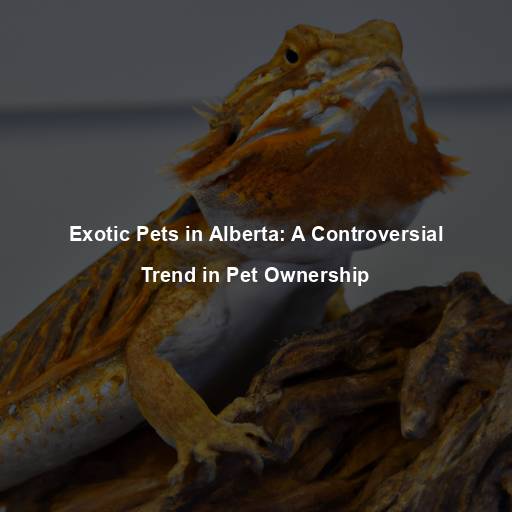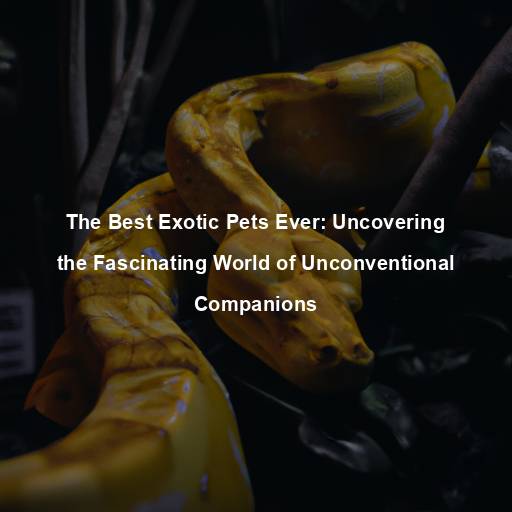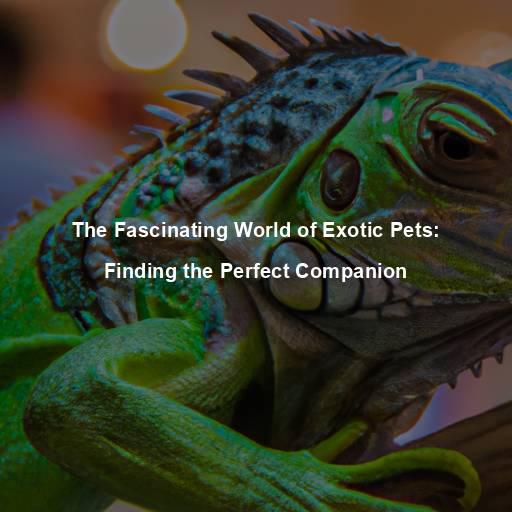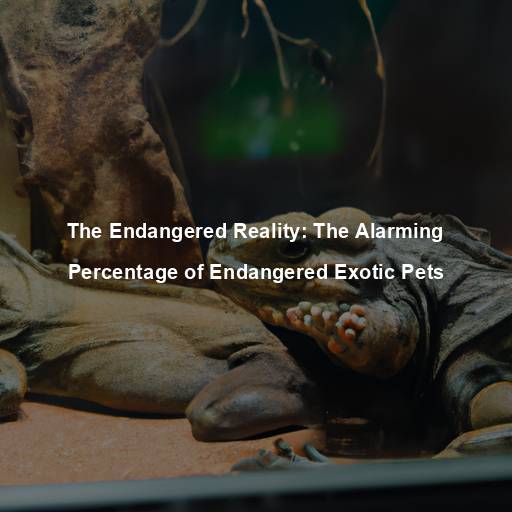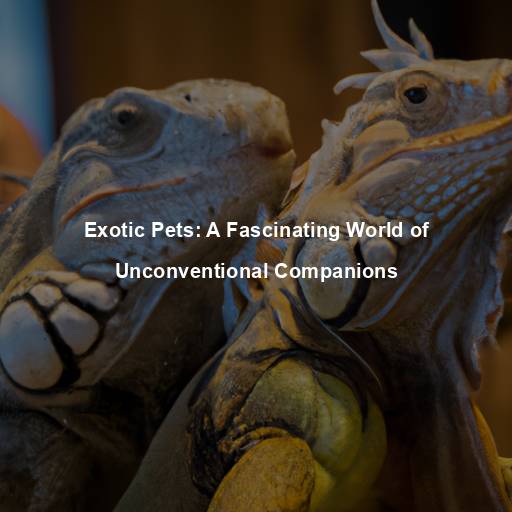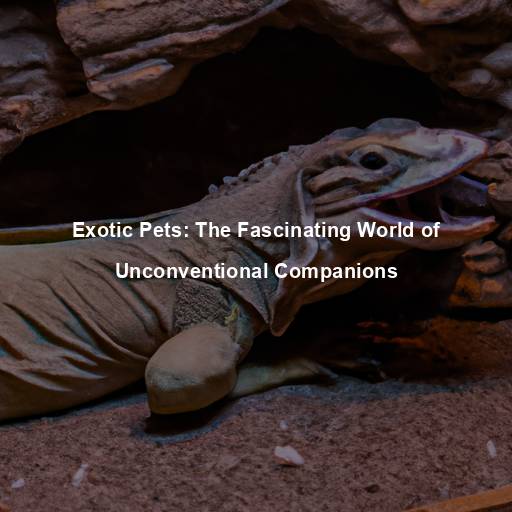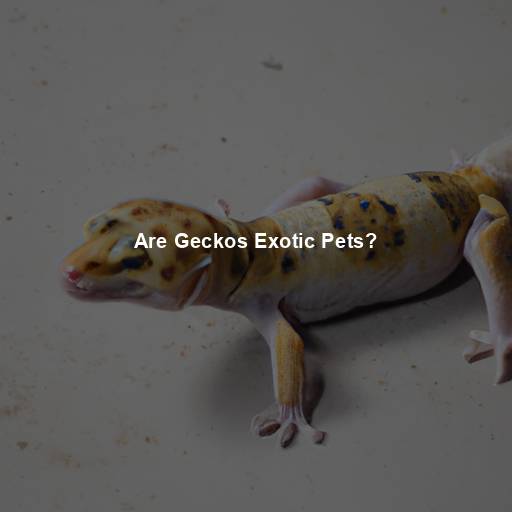Exotic Pets in Alberta: A Controversial Trend in Pet Ownership
Last Updated on August 4, 2023 by Evan
Contents [hide]
- 1 Exploring the Fascination with Exotic Pets
- 1.1 A Thriving Exotic Pet Trade
- 1.2 The Appeal and Perils of Exotic Pet Ownership
- 1.3 The Legal Landscape: Regulations and Restrictions
- 1.4 The Ethical Dilemma: Balancing Individual Rights and Animal Welfare
- 1.5 Conservation Concerns and Ecosystem Impact
- 1.6 Education and Responsible Ownership
- 1.7 Striking a Balance
- 1.8 Disrupting Ecosystem Dynamics
- 1.9 Disease Transmission
- 2 The Need for Responsible Pet Ownership
- 3 Ethical Considerations
- 4 Promoting Responsible Practices
- 5 The Role of Exotic Pet Trade and Breeding
- 6 The Importance of Research and Expert Advice
- 7 Striving for a Balanced Approach
- 8 FAQs: Exotic Pets in Alberta
- 8.1 Can I legally own an exotic pet in Alberta?
- 8.2 What exotic pets are allowed to be owned in Alberta?
- 8.3 Do I need a license or permit to own an exotic pet in Alberta?
- 8.4 Are there any restrictions on breeding or selling exotic pets in Alberta?
- 8.5 What should I consider before owning an exotic pet in Alberta?
Exploring the Fascination with Exotic Pets
The allure of exotic pets has always been undeniable – their presence adds a certain je ne sais quoi to any domestic setting. From the vibrant plumage of tropical birds to the mysterious allure of reptiles, these unconventional companions have woven themselves into the tapestry of pet culture. Yet, amidst this fascination, a peculiar trend has emerged in Alberta, Canada, beckoning us to question the consequences of owning such extraordinary creatures. The controversy surrounding this growing practice raises perplexing concerns about the impact on both animal welfare and the communities they now call home.
A Thriving Exotic Pet Trade
The allure of owning an exotic pet has fueled a thriving industry, with an array of animals being traded across borders and continents. Alberta, known for its diverse wildlife and natural beauty, has become a hotspot for exotic pet enthusiasts. Whether it’s a charismatic chameleon, an inquisitive hedgehog, or an elegant sugar glider, the demand for these unique creatures has created a lucrative market that connects breeders, suppliers, and eager buyers.
The Appeal and Perils of Exotic Pet Ownership
The desire to own an exotic pet stems from a variety of factors, including the fascination with rare and unusual species, the quest for status and uniqueness, and the appeal of owning an animal that stands out from the crowd. Exotic pets can be seen as exotic status symbols, allowing their owners to display their love for the extraordinary and their willingness to take on the responsibility of caring for a non-traditional pet.
Delving into the enchanting world of exotic pets reveals a tapestry woven with complexities and uncertainties. These captivating creatures demand a level of expertise and an understanding of their distinct habitats and dietary requirements that may prove baffling within the confines of a home. Ignorance or misunderstanding of their intricate needs can result in subpar care, triggering a whirlwind of physical and emotional anguish. Furthermore, bringing non-native species into new surroundings carries with it a potent storm of consequences, wreaking havoc upon local ecosystems and the delicate balance of biodiversity.
The Legal Landscape: Regulations and Restrictions
Keeping unique and fascinating creatures as pets is a subject that raises many complexities and uncertainties. Different regions have their own laws and regulations in place to strike a balance between the welfare of these animals and the safety of the communities they coexist with. In Alberta, for example, the Wildlife Act acts as a guiding force, setting boundaries on the possession, breeding, and sale of exotic pets. While some species are prohibited due to their potential threat to public safety or native wildlife populations, there are still a variety of exotic animals, such as reptiles, amphibians, and small mammals, that can be legally owned by those who obtain the necessary permits and licenses.
The Ethical Dilemma: Balancing Individual Rights and Animal Welfare
The rise in popularity of exotic pets raises ethical questions regarding the welfare of these animals and the responsibility of their owners. While some argue that individuals should have the freedom to choose the companionship they desire, others contend that the well-being of animals should take precedence over personal desires. Striking a balance between individual rights and animal welfare becomes a paramount consideration when discussing the ownership of exotic pets.
Conservation Concerns and Ecosystem Impact
The moment we place a spotlight on the introduction of exotic pets into unfamiliar habitats, we begin to unravel a complex web of ethical dilemmas and ecological conundrums. The repercussions are not limited to a mere clash of values, but extend deep into the intricate tapestry of our delicate ecosystems. Escaped or freed from human captivity, exotic pets morph into relentless invaders, fiercely competing with the locals for resources in a perplexing battle for survival. Such invasive behavior encroaches upon the very essence of biodiversity, casting a dark shadow of uncertainty upon the future of our native fauna, and potentially tumbling them towards the abyss of extinction.
Education and Responsible Ownership
As the demand for exotic pets continues to grow, education and awareness play a crucial role in promoting responsible ownership. Prospective owners must be well-informed about the specific needs, behaviors, and requirements of the species they wish to acquire. They should also be aware of the legal implications and restrictions associated with owning exotic pets. By providing comprehensive education and resources, society can empower individuals to make informed decisions and ensure the well-being of both the animals and the communities they inhabit.
Striking a Balance
The debate surrounding exotic pets in Alberta is complex and multifaceted, encompassing considerations of animal welfare, individual rights, conservation, and public safety. While the allure of owning an exotic pet may be enticing, it is crucial to approach this trend with caution and a deep understanding of the responsibilities involved. Balancing the desire for unique companionship with the well-being of the animals and the preservation of ecosystems is a delicate task that requires thoughtful reflection and responsible action.
The influx of exotic pets in Alberta has left an indelible mark on the local wildlife, igniting a passionate debate that swirls with complexity and bewilderment. As these charismatic creatures infiltrate the natural habitats, the fragile ecological balance trembles under the weight of uncertainty. While adorning our lives with the allure of the unusual, we must pause to ponder the poignant questions of animal welfare, conservation, and public safety that reverberate through the hearts and minds of both conservationists and pet enthusiasts alike. Only through an enlightened approach that combines rigorous education, responsible ownership, and vigilant regulation, can we endeavor to harmonize our boundless intrigue with the extraordinary and our solemn vow to safeguard the well-being of these captivating creatures and the delicate ecosystems they intrude upon.
Disrupting Ecosystem Dynamics
The arrival of unfamiliar critters in unfamiliar lands can cause quite the stir among the indigenous wildlife. You see, once these critters break free from their confines or are merely set loose, they go ham on the local scene and become real invasive troublemakers. They start hogging up all the goodies that native species rely on, like a gang of resource-hungry bandits. It’s like they’re playing a dangerous game of ecological dethroning, where the locals are left scrambling for their very existence.
Disease Transmission
Did you know that owning exotic pets can actually have a hidden downside? It turns out that these fascinating creatures can unintentionally bring dangerous diseases into new environments. Alberta, in particular, faces the risk of exotic species carrying pathogens that local wildlife is completely unprepared for. This alarming situation can lead to devastating consequences for the indigenous wildlife population, highlighting the serious consequences of releasing exotic pets into the wild.
The Need for Responsible Pet Ownership
Specialized Care and Expertise
Owning an exotic animal is no walk in the park! It’s a whole different ballgame compared to your run-of-the-mill pets. These extraordinary creatures come with a laundry list of demands that will leave you scratching your head in bewilderment. From creating a mini tropical paradise with the right temperature and humidity to serving up a gourmet meal plan tailored to their finicky taste buds, you need to be ready to dive deep into the world of exotic pet care.
Financial Considerations
Owning an exotic pet can also be financially demanding. The initial cost of acquiring the animal, along with ongoing expenses for appropriate enclosures, specialized diets, and veterinary care, can quickly add up. It is essential for potential owners to consider the long-term financial commitment required to provide adequate care for these animals. Failure to meet their needs due to financial constraints can have severe consequences for the health and well-being of the exotic pet.
Legal Obligations and Permits
Thinking about bringing an exotic pet into your life? Hold on a second! It’s crucial to take a deep dive into the legal jungle before making any commitments. In Alberta, it’s no walk in the park – you’ll need to obtain permits and licenses galore for certain exotic species.
Ethical Considerations
Animal Welfare Concerns
The hotly contested moral quandary swirling around the contentious topic of possessing exotic pets orbits its locus on the primacy of creature comfort and animal welfare. Within this intricate realm, one detects an intricate tapestry of intricate social, behavioral, and ecological requirements — a veritable maze ensnaring the domestic fabric we inhabit. For these enigmatic beings, confinement within the walls of captivity often begets a flurry of distress markers, permeating the emotional and physical distress, thus deflating the very essence of their existence. It behooves us, therefore, to embrace a discerning prism through which we scrutinize the veracity of fulfilling nature’s yearning within the confines of exotic pet ownership, and ascertain the elemental welfare bestowed upon these enigmatic souls.
Conservation and Biodiversity
The conservation of native species and biodiversity is another critical ethical consideration. By owning exotic pets, individuals may inadvertently contribute to the decline of native species and disrupt local ecosystems. Releasing exotic pets into the wild poses a significant risk, as they can outcompete and prey upon native species, leading to imbalances in natural habitats. Responsible pet ownership should prioritize the preservation of native wildlife and the conservation of ecosystems.
Promoting Responsible Practices
Education and Awareness Campaigns
To address the challenges associated with owning exotic pets, education and awareness campaigns play a crucial role. Providing comprehensive information about the specific needs, care requirements, and potential risks of owning exotic animals can help individuals make informed decisions. These campaigns can also emphasize the importance of responsible pet ownership, including the need for research, proper care, and compliance with legal obligations. By empowering potential owners with knowledge, society can work towards reducing the negative impact of exotic pet ownership.
Collaboration between Government and Animal Welfare Organizations
It’s a jungle out there when it comes to exotic pets and the authorities are finally taking notice. With the rise in popularity of keeping wild and exotic creatures as pets, government agencies and animal welfare organizations are teaming up to tackle this perplexing issue. Through a unique collaboration, they are aiming to introduce regulations that will not only protect these majestic creatures but also safeguard the communities they reside in. This burst of joint efforts includes stricter permit requirements, regular inspections of facilities, and a valuable outreach program to educate potential owners on the demands of caring for exotic animals.
Potential Threats to Humans
The ownership of exotic pets raises valid concerns about public safety. While many exotic animals may appear harmless or docile, they can pose significant risks to humans, especially if they are not properly cared for or handled. Some species have the potential to cause injuries, transmit diseases, or escape and pose a threat to the community. Ensuring public safety is paramount, and regulations surrounding exotic pet ownership aim to minimize the potential risks associated with these animals.
Mitigating Risks through Responsible Ownership
The secret to keeping exotic pets lies in the hands of responsible owners who dare to unravel the mysteries that come with embracing these extraordinary creatures. It is not a task for the faint-hearted, as one must dive into the depths of knowledge surrounding the unique needs and peculiar behaviors of these species. Guided by the enigmatic art of handling and armed with secure enclosures, these fearless keepers step into a world where health risks lurk. However, it is through their dedication and unwavering commitment that they succeed in minimizing the enigmatic risks, forging a delicate bond between themselves, their surroundings, and the captivating creatures they hold dear.
The Role of Exotic Pet Trade and Breeding
Ethical Concerns in the Exotic Pet Trade
The world of exotic pets is a captivating labyrinth, filled with both ethereal wonders and confounding enigmas. Within this intricate tapestry, one encounters a spectrum of actors, ranging from noble caretakers who ensure the well-being of their enchanting charges, to shadowy figures who clandestinely engage in nefarious activities. Prospective guardians of these extraordinary creatures must navigate this turbulent landscape with sagacity, striving to unveil the mysteries shrouding the origins of their chosen companions. By wholeheartedly endorsing ethical breeders who champion the welfare of these celestial beings, we can collectively illuminate the path towards a harmonious coexistence between man and the mesmerizing realm of exotic pets.
Alternatives to Wild-Caught Animals
One way to address ethical concerns in the exotic pet trade is to encourage the adoption of captive-bred animals instead of wild-caught ones. Captive breeding programs help reduce the demand for animals taken from their natural habitats, which can have detrimental effects on wild populations. By supporting responsible breeders and adopting captive-bred animals, individuals can contribute to the conservation of wild species while still enjoying the companionship of an exotic pet.
The Importance of Research and Expert Advice
Understanding the Needs of Exotic Pets
Thinking about bringing an exotic pet into your life? Hold your horses! Before you dive into this wild adventure, it’s absolutely crucial to arm yourself with knowledge. Dig deep and get a grasp on everything from their peculiar behaviors and unique necessities to their dietary quirks and social dynamics.
Seeking Professional Guidance
Navigating the wild world of exotic pet ownership can be a perplexing journey, but fear not! Seeking out sage counsel from the wise minds of zoologists, herpetologists, or avian specialists will surely quell any doubts and burst forth a trove of knowledge. With their expert advice on enclosure design, nutrition, enrichment, and overall care, prospective pet owners can rest assured that they are fully prepared for the thrilling challenges that come with these extraordinary creatures. So, muster your courage, dear readers, and embark on this marvelous adventure towards a harmonious bond with your exotic companions!
Striving for a Balanced Approach
Encouraging Ethical Pet Ownership
Ensuring the well-being of our wild companions requires a dedicated focus on responsible and ethical pet ownership. It is imperative to enlighten prospective owners about the unique demands and obligations that accompany these extraordinary creatures. Equally important is raising consciousness regarding the intricate maze of risks and ethical conundrums entangled within the exotic pet trade. Through cultivating a mindset that emphasizes responsible guardianship, we can collectively diminish the detrimental ripple effect on animal welfare, public safety, and conservation endeavors.
Collaboration for Effective Regulation
In the ever-evolving landscape of exotic pet ownership, it is imperative that a tapestry of collaboration is woven between government entities, animal welfare organizations, and field experts. By avoiding the quagmire of individual interests, these stakeholders can orchestrate a symphony of legislation that strikes the delicate balance between personal freedoms, the welfare of these unique creatures, and the preservation of our delicate ecosystems. Through the prism of regular evaluation and updates, we can ensure that these regulations remain a compass, guiding us through the perplexing maze of challenges that lie ahead in the world of exotic pets.
FAQs: Exotic Pets in Alberta
Can I legally own an exotic pet in Alberta?
Yes, you can legally own certain exotic pets in Alberta, but there are specific rules and regulations in place. The Alberta Fish and Wildlife Act prohibits the possession and importation of certain exotic animals that are considered a threat to the environment, agriculture, or public safety. These animals include big cats, non-human primates, certain reptiles, and certain venomous snakes. However, there are exemptions for accredited zoos, research facilities, and educational institutions.
What exotic pets are allowed to be owned in Alberta?
In the vast realm of Alberta, where the untamed spirit of adventure roams free, a peculiar tapestry of exotic pets adds a touch of vibrant mystique to the lives of its inhabitants. Curiously enough, those who call this land home have the privilege of embracing certain captivating creatures without fear of upsetting the delicate balance of public safety or environmental harmony. Among the captivating repertoire of legally permissible companions are the feathered enchanters known as birds, the whimsical hoppers of the rabbit and guinea pig realm, the mischievous maze navigators of the rat and hamster universe, the serpentine marvels of non-venomous snakes, the slow and steady turtles, the mystical sugar gliders, and even a select cast of small exotic cat species, including the noble servals and fascinating savannah cats. Intrigued souls yearning for the companionship of these extraordinary beings must embark on a journey of research and consultation with the esteemed authorities to navigate the intricate labyrinth of ownership legality.
Do I need a license or permit to own an exotic pet in Alberta?
Owning an exotic pet in Alberta comes with its fair share of red tape and regulations. While your furry feline or faithful canine companions won’t require any special permits, the same cannot be said for some of their more unconventional counterparts. If you have your heart set on a scaly reptile or a rare avian friend, it’s essential to navigate the maze of licensing requirements. To avoid any legal troubles, reach out to the knowledgeable folks at the Alberta Fish and Wildlife Division or consult your local municipality for the lowdown on permits and licenses for your desired exotic pet.
Are there any restrictions on breeding or selling exotic pets in Alberta?
Yes, there are restrictions on breeding and selling exotic pets in Alberta. Breeding and selling certain exotic animals without the appropriate permits or licenses is illegal. Alberta has regulations in place to prevent the sale and breeding of exotic pets that could pose a risk to the environment, indigenous species, or public safety. Selling exotic pets without obtaining the necessary permits can result in penalties and fines. Therefore, it is important to familiarize yourself with the specific regulations concerning breeding and selling exotic pets in Alberta.
What should I consider before owning an exotic pet in Alberta?
Before owning an exotic pet in Alberta, there are several factors to consider. Firstly, research and understand the specific care requirements, behavior, and lifespan of the exotic pet you wish to own. Ensure that you have the proper knowledge, facilities, resources, and time to provide adequate care for the animal. It is also essential to consider the long-term commitment involved, as some exotic pets can live for many years. Additionally, familiarize yourself with the legal requirements, permits, licenses, and restrictions associated with owning an exotic pet in Alberta. Finally, consider the potential challenges of finding appropriate veterinary care and specialized diet requirements for certain exotic species.

